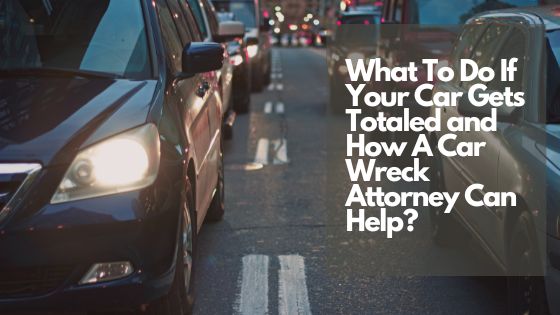When your insurance company tells you that your car is totaled, it means the cost to repair your car is equal to or has exceeded the value of your vehicle. You may be wondering how a claims adjuster arrived at that conclusion and what legal options are available to you.
Once your car has been declared totaled, the next steps should be easy. You’ll be issued a settlement check, and your claim will be concluded. However, even though you received compensation quickly, it may not be in your best interest. A seasoned car wreck attorney can review your claim and work towards winning a better settlement offer that you deserve.

Texas Laws on Totaled Vehicles
Insurance companies in Texas determine if a car is totaled using guidelines provided in state laws. According to the Texas Transportation Code Section 501.091(15), a vehicle is considered totaled if it’s missing or has damage to a major component. In addition, the cost of the parts and labor usually exceeds the vehicle’s actual cash value (ACV).
The ACV refers to a vehicle’s prevailing market value. However, it’s important to note that insurance companies can decide to total a car even if the cost of the damage hasn’t reached the ACV. In many instances, the ACV is used as a threshold for considering a totaled vehicle.
Claiming a Higher Value Settlement
Getting an accurate ACV is critical and computing a higher value will be better for you. However, some insurers will be looking after their bottom line instead of the needs of accident victims. For this reason, they will find ways to determine a lower ACV.
There are two crucial points to consider when determining the amount you can claim:
- If you are at fault: Your insurance company should write you a check equal to your vehicle’s ACV minus deductibles from your policy. In addition, you must have collision coverage in your policy.
- If the other driver is at fault: The other driver’s insurer will pay you the ACV. The difference, in this case, is that there should be no deductible.
Insurance companies compute a vehicle’s ACV by determining the replacement cost and subtracting its depreciation. However, there are other methods for calculating the ACV. These different methods include determining the vehicle’s fair market value, and another is using the broad evidence rule. An experienced car wreck attorney will help you select the best method to win a higher claim.
However, in many instances, it can be better for you to base the ACV on your vehicle’s Kelley Blue Book value. The Kelley Blue Book (KBB) has been used as the auto industry’s standard since the 1920s. This guide lists the values of new vehicles and the prices of used cars and serves as a reliable method for determining your vehicle’s fair market value.
Using the KBB allows you to use car sales data when determining the ACV. If the local car prices in your area are higher than what the insurer estimates, you should use the KBB value to determine a better ACV.
A seasoned car wreck lawyer can help you make a counteroffer to the insurance adjuster. You can make a case for a better payoff using data pulled from local car values.
Your car wreck attorney can use any of these approaches:
- Establishing a higher market value: Find comparable vehicles to your car with a higher fair market value. You can use that information to argue that your ACV computation is more accurate than what the insurance adjuster is using. Some adjusters use national averages, which don’t reflect prevailing local market prices.
- Establishing a higher value for your vehicle: The value of your vehicle isn’t always comparable to other cars in the market. Some owners may have upgraded their cars with expensive aftermarket parts, increasing their value. Custom paint jobs also increase the ACV of your vehicle. In addition, getting new parts installed during repairs also raising your car’s market value.
An experienced car wreck lawyer will determine the best ACV computation using these methods. The goal is to compute a better value for your vehicle so that you can secure a higher claim.
When Is It Better To Have Your Car Totaled?
There are situations when it will be better to have an insurance adjuster total your car instead of getting an award for repairs. Sometimes it’s more convenient for you to find a replacement vehicle regardless of your car’s actual condition.
Vehicle owners must file a salvage title for a wrecked vehicle with the Texas DMV. Unfortunately, the title will stay with the vehicle, lowering its market value despite repairs and later upgrades. This means the worth of your car will be a lot less, and getting a replacement will be the better option.
A reliable car wreck attorney can help you challenge an insurance adjuster who won’t declare a totaled car. Your attorney can point out hidden damages or suggest that the frame can be damaged. If the estimates are close enough, the adjuster might agree with you and have your case closed.
Work With a Seasoned Car Wreck Lawyer
You have better chances of winning a better settlement claim after a vehicle accident with the help of an experienced car wreck attorney. You can work the settlement details using reliable and current information to press your case with insurance adjusters. Obtain the best settlement claim you deserve by calling the Law Offices of David Kohm today at any of our convenient locations and get a free consultation.
Arlington (817) 522-4451
Dallas (972) 362-6848
Fort Worth (817) 764-1375
Plano (972) 354-4602
Cedar Hill (972) 338-9427
McKinney (469) 522-3688
Lewisville (972) 354-4605
Frisco (972) 725-7681
Grapevine (817) 835-8677
Irving (972) 354-4610
Keller (817) 204-0904
Garland (214) 572-2251
Denton (940) 222-4060
Addison (972) 564-8108
You can also contact us online by using our quick contact form.










